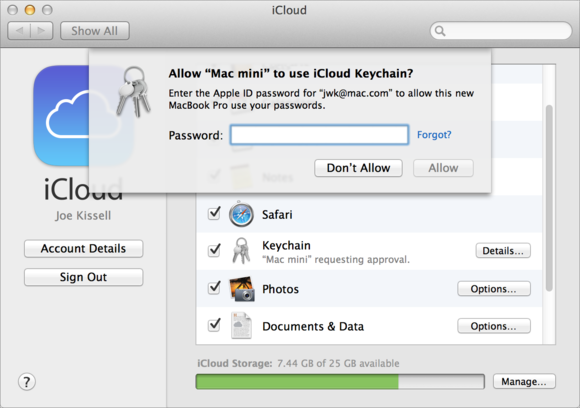
Apple Notification Asking For Google Password On Mac Desktop
Where a GPU type card is detected, checking the Enable 3D Acceleration box will improve the image display performance. Mac vs surface for photo editing and graphic design. The 3D support will also improve the performance of the brushes.
Google.com Q. Every time I start up Chrome, it pesters me for access to my Mac's password Keychain.
Should I let it? How do I stop it from asking? Google means well with this poorly-presented request--its way of asking if it can keep your passwords in sync with other copies of its browser. But you should decline the offer unless you use Chrome as your primary browser on a Mac and you can secure your computer against curious passerby, change a hidden and experimental setting or do both. This situation can arise if you enable Chrome's optional sign-in feature, which syncs your browser use--not just bookmarks, but open pages, settings and passwords--across multiple devices. If you'd already saved Web passwords in Apple's Safari browser, Chrome will ask if it, too, can have access to the OS X Keychain's database of those logins.
Unfortunately, the standard Keychain-access dialog only has 'Allow,' 'Always Allow' and 'Deny' buttons--not 'Get out of my face and don't ever ask again.' After I tweeted a little rant over that, Ars Technica's Jon Brodkin pointed out a fix: In Chrome's settings, click the 'Advanced Sync Settings' button and uncheck 'Passwords.' Chrome hasn't bothered me with a Keychain nag since. But even having Chrome confine saved passwords to your own computer can carry a security risk. By default, this browser lets anybody with access to your screen inspect saved logins without further authentication--as you can see by typing 'chrome://settings/passwords' into its address bar and clicking the 'Show' button next to each entry.
According to Apple, for folks using OS X El Capitan v10.11.5 or later, “High Sierra conveniently downloads in the background, making it even easier to upgrade your Mac. When the download has completed, you receive a notification indicating that High Sierra is ready to be installed.”. If you recently had to change your password, make sure that you change it in Yahoo Messenger as well or you will have this problem of WLM continually asking you for the password and you will get locked out. I just changed my password in Yahoo Messenger and now WLM is working fine.
To thwart that, you'll either need to stop it from saving passwords and clear those already saved (in its settings page, click 'Show advanced settings') or set your computer's screen to require a password to unlock after a few minutes of inactivity. That second stop is a good idea anyway on a laptop. Google took a lot of deserved heat when developer Elliott Kember called out this 'insane password security strategy' in a blog post last August.
After initially defending Chrome's system on the grounds that, hey, anybody with access to your computer could run a specialized app to grab your passwords, Google has quietly added an extra, experimental lock. As upgrades go, this one is exceptionally well buried. The most public notice seems to have been Google+ posts by a Google employee, and the option itself isn't even in the normal settings interface. Instead, type 'chrome://flags' in the address bar and search for 'Password Manager Reauthentication'; click the 'Enable' button and restart the browser.

From then on, you'll have to enter the system password to see saved passwords--just as you would in Safari or in OS X's Keychain Access app. This worked as advertised in OS X, but in Windows 8.1 Chrome said the option was 'not available on your platform.'
Keeping passwords in sync and secure across different devices isn't easy, especially if they don't all run the same kind of browser. In a multiple-computer situation, I suggest looking past Chrome's password synchronization and Apple's iCloud Keychain (limited to Apple's latest browsers) in favor of LastPass. This Fairfax, Va., company's encrypted service is free to use on the desktop; a $12/year premium option adds mobile-app support. Or you can employ a free, cross-platform option I've endorsed many times before after hearing it from security expert Bruce Schneier years ago: Write your passwords down on a piece of paper--without clearly identifying which site they match--and stick that it in your wallet. You already know how to keep your wallet safe, and if you lose your wallet that slip of paper will be less interesting to a thief than others that happen to feature portraits of George Washington, Abraham Lincoln, Andrew Jackson, Alexander Hamilton or Ben Franklin.
Tip: Chrome now tells you which open page has its own soundtrack The latest version of Chrome finally brings blessed relief for a bane of modern computing: Wondering which of 10 or 20 open pages started playing music or video. The version shipped Tuesday identifies the offending site with a little speaker icon in its tab; other tab icons incidate if a site is using your computer's webcam or 'casting' its content to a Chromecast player. I'd prefer that sites and ads had the manners to avoid making a racket until clicked upon, but in the meantime this improvement will do. — Rob Pegoraro is a tech writer based out of Washington, D.C. To submit a tech question, e-mail Rob at rob@robpegoraro.com. Follow him on Twitter at twitter.com/robpegoraro.
To get adobe photoshop cs6 license key. Download photoshop fre trial for mac.